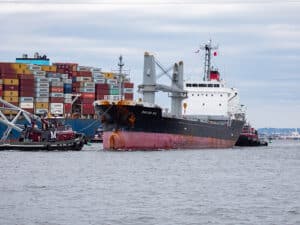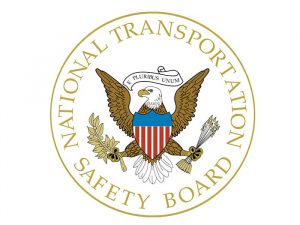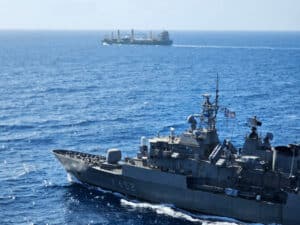
Canada: RCMP and TSB start Titan submersible investigations
Written by Nick Blenkey
RCMP Newfoundland and Labrador Superintendent Kent Osmond: “Review does not necessarily mean anything criminal has occurred.” [Image; Screen grab from CTV Montreal video]
When the ship that launched the doomed submersible Titan, the Research Vessel Polar Prince, returned to St John’s, Newfoundland, Saturday, among the first to board it were investigation teams from the Canadian Transportation Safety Board (TSB) and the Royal Canadian Mounted Police RCMP. While the TSB investigation came as no surprise, the RCMP involvement is perhaps less expected — though a high ranking RCMP official says “such investigations are common.”
News that the Canadian investigations were starting was followed by an announcement by the U.S. Coast Guard that it was concluding search and rescue efforts and convening a marine board of inquiry into the loss.
Much has already emerged about the loss.
It now seems probable that the Titan imploded Sunday, June 18, likely around the time that the Polar Prince lost contact with it 1 hour and 45 minutes after the submersible started its attempted dive to the wreck of the Titanic with five people on board. The report of the loss of contact set off a massive search and rescue effort, attracting wide media attention that, in turn, raised a number of disturbing questions about the practices of its operator, OceanGate Expeditions, and its CEO, Stockton Rush.
Rush was among the five on board the Titan. The others were Hamish Harding, the chairman of Action Aviation, a sales and air operations company based in Dubai; Paul-Henri Nargeolet, a veteran French diver and maritime expert who had been on more than 35 dives to the Titanic wreck site and was director of underwater research for RMS Titanic, Inc., an American company that owns the salvage rights to the wreck; and British-Pakistani businessman Shahzada Dawood, 48, and his son, Suleman, 19,
While the TSB says it will “conduct a safety investigation regarding the circumstances of this operation conducted by the Canadian-flagged vessel Polar Prince,” the RCMP’s inquiry might be wider ranging.
Both the TSB and RCMP were circumspect in their initial statements. TSB noted that there were 17 crew members and 24 people on board the Canadian-flagged Polar Prince (including the five who boarded the Titan) and that, “in accordance with the Canadian Transportation Accident Investigation and Safety Board Act and international agreements, the TSB, as the investigation authority of the flag state of the support vessel involved in the occurrence, will conduct a safety investigation regarding the circumstances of this operation conducted by the Canadian-flagged vessel Polar Prince.“
The Polar Prince is listed on the IMO data base not as a research vessel but as a buoy tender. It was built in 1959 and served as the CCGS Sir Humphrey Gilbert, a Canadian Coast Guard light icebreaker, until 1986. Since then it has had a number of owners and roles, with its current operator being Horizon Maritime Services, which also operates the Horizon Arctic, one of the ROV-equipped ships deployed on the Titan SAR operation.
“A team of TSB investigators is traveling to St. John’s, Newfoundland and Labrador, to gather information, conduct interviews, and assess the occurrence. In the coming days, we will coordinate our activities with other agencies involved,” said the initial TSB statement.
The RCMP, said Saturday that it is “examining the circumstances that led to the deaths of the five individuals who were aboard the submersible Titan to determine if a full investigation is warranted.
“Such an investigation will proceed only if the RCMP’s examination of the circumstances indicate criminal, federal or provincial laws may possibly have been broken,” said the statement.
RCMP Newfoundland and Labrador Superintendent Kent Osmond says a team has been formed for a preliminary study to determine if a full investigation is warranted, or if any laws have been broken. No timeline has been set for the preliminary inspection.
Osmond says this case is a unique circumstance due not only to the nature of the incident, but the number of jurisdictions involved.
Osmond notes that such a review does not necessarily mean anything criminal has occurred, adding that “such investigations are common, as the RCMP has jurisdiction to investigation offshore deaths.”
USCG MARINE BOARD OF INQUIRY
A marine board of inquiry (MBI) is the highest level of investigation in the Coast Guard. Upon completion of the investigation, the board will issue a report to the Commandant with the evidence collected, the facts established, its conclusions, and recommendations.
The Coast Guard says the MBI is working in close coordination with other national and international authorities including the United States National Transportation Safety Board, Canadian Transportation Safety Board, French Marine Casualties Investigation Board, and United Kingdom Marine Accident Investigation Branch.
During the course of the MBI, the board will work to determine:
- The cause of the casualty, including the cause of any death.
- Whether an act of misconduct, incompetence, negligence, unskillfulness, or willful violation of law committed by any individual licensed, certificated, or documented has contributed to the cause of the casualty, or to a death involved in the casualty, so that appropriate remedial action may be taken.
- Whether an act of misconduct, incompetence, negligence, unskillfulness, or willful violation of law committed by any person, including an officer, employee, or member of the Coast Guard, contributed to the cause of the casualty, or to a death involved in the casualty.
- Whether there is evidence that an act subjecting the offender to a civil penalty under that laws of the United States has been committed, so that appropriate action may be undertaken to collect a penalty.
- Whether there is evidence that a criminal act under the laws of the United States has been committed, so that the matter may be referred to appropriate authorities for prosecution.
- Whether there is need for new laws or regulations, or amendment or repeal of existing laws or regulations, to prevent the recurrence of the casualty.




